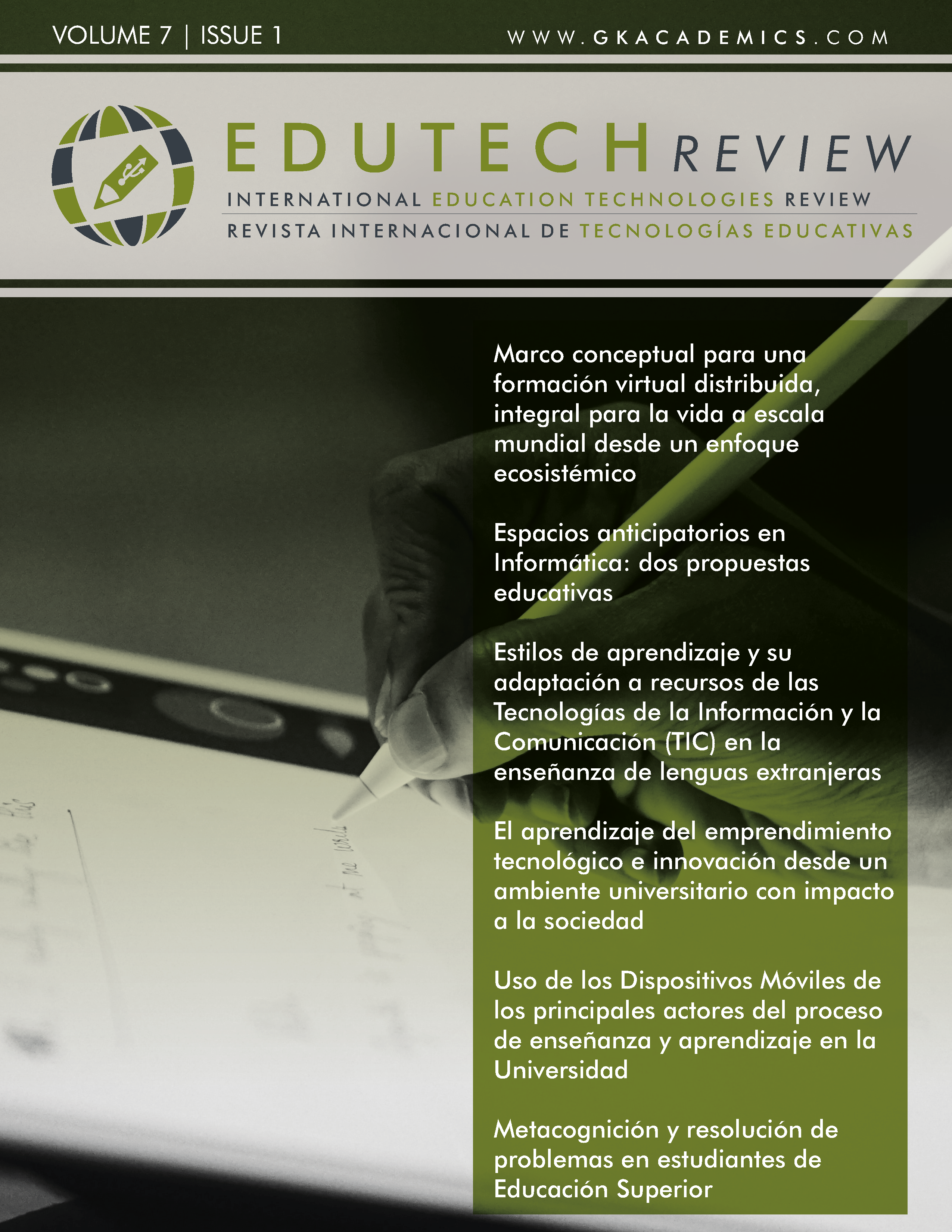Metacognition and problem-resolution for College Students
DOI:
https://doi.org/10.37467/gka-revedutech.v7.2581Keywords:
Metacognition, Problem-resolution, Self-controlAbstract
Learning in virtual environments consists of a conscious, planned and controlled process (metacognitive skills), so the teacher must identify if there are difficulties. The objective was to identify metacognitive skills in higher level students through knowing their planning and control capacity in a game situation (Tower of Hanoi) (Flores, Ostrosky y Lozano, 2013). 93 students participated, average of 20 years (60 women and 33 men). Overall results point to average performance in your planning capacity and in execution time. However, some participants will need more personalized accompaniment.
Global Statistics ℹ️
|
668
Views
|
2238
Downloads
|
|
2906
Total
|
|
References
Esteban, M. y Zapata, M. (2016). Estrategias de aprendizaje y eLearning. Un apunte para la fundamentación del diseño educativo en los entornos virtuales de aprendizaje. RED. Revista de Educación a Distancia. 50.
Jaramillo, L. y Simbaña, V. (2014). La metacognición y su aplicación en herramientas virtuales desde la práctica docente. Sophia: colección de filosofía de la educación, 16 (1), pp. 299-313.
Flores, J., Ostrosky, F. y Lozano A. (2008). Batería de Funciones Frontales y Ejecutivas: Presentación. Revista Neuropsicología, Neuropsiquiatría y Neurociencias. 8 (1), 141-158
Flores, J., Ostrosky, F. y Lozano A. (2013). BANFE Batería Neuropsicológica de Funciones Ejecutivas y Lóbulos Frontales. México, Manual Moderno.
León-Carreón, J. (2015). Fundamentos de neuropsicología humana. Editorial Síntesis: Madrid,España.
López, C., Flores, K., Rodríguez, M. y De la Torre, E. (2012). Análisis de una experiencia de entornos virtuales de aprendizaje en educación superior: el programa de cursos en línea del centro universitario del sur de la Universidad de Guadalajara, México. Revista Iberoamericana De Educación. 60. Recuperado de https://rieoei.org/historico/documentos/rie60a06.pdf DOI: https://doi.org/10.35362/rie600446
Mayora, I. (2013). Estrategias metacognitivas aplicadas a la comprensión de la lectura por estudiantes de inglés I. Caso Vice-rectorado “Luis Caballero Mejías”. Revista de investigación. 37(78).
Mayor, J., Suengas, A. y González, J. (1995). Estrategias metacognitivas. Editorial síntesis: Madrid, España.
Osses, S., y Jaramillo. (2008). Metacognición: un camino para aprender a aprender. Estudios pedagógicos. 2 (1). Recuperado de https://scielo.conicyt.cl/scielo.php?script=sci_arttext&pid=S0718-07052008000100011
Spitz, H, Minsky, S. y Bessellieu C. (1984) Subgoal length versus full solution length in predicting Tower of Hanoi problem-solving performance. Bulletin of the Psychonomic Society, 22 (4), 301-304. DOI: https://doi.org/10.3758/BF03333826
Zimmerman B. J. (1990). Self-Regulated Learning and Academica Achievement: An Overview. Educational Psychologist, 25 (1), 3-17. Recuperado de https://www.researchgate.net/publication/243775466_SelfRegulated_Learning_and_Academic_Achievement_An_Overview DOI: https://doi.org/10.1207/s15326985ep2501_2
Downloads
Published
How to Cite
Issue
Section
License
Those authors who publish in this journal accept the following terms:
- Authors will keep the moral right of the work and they will transfer the commercial rights.
- After 1 year from publication, the work shall thereafter be open access online on our website, but will retain copyright.
- In the event that the authors wish to assign an Creative Commons (CC) license, they may request it by writing to publishing@eagora.org







